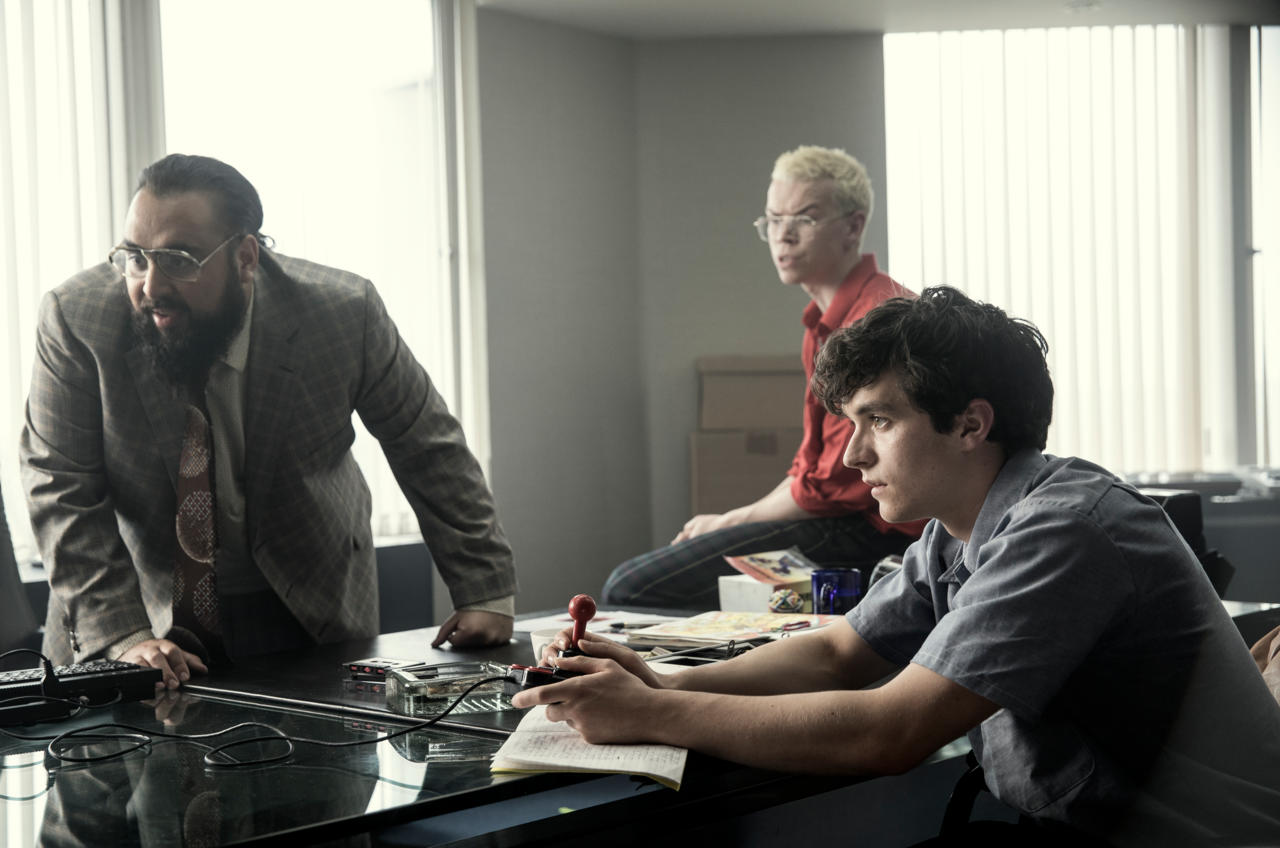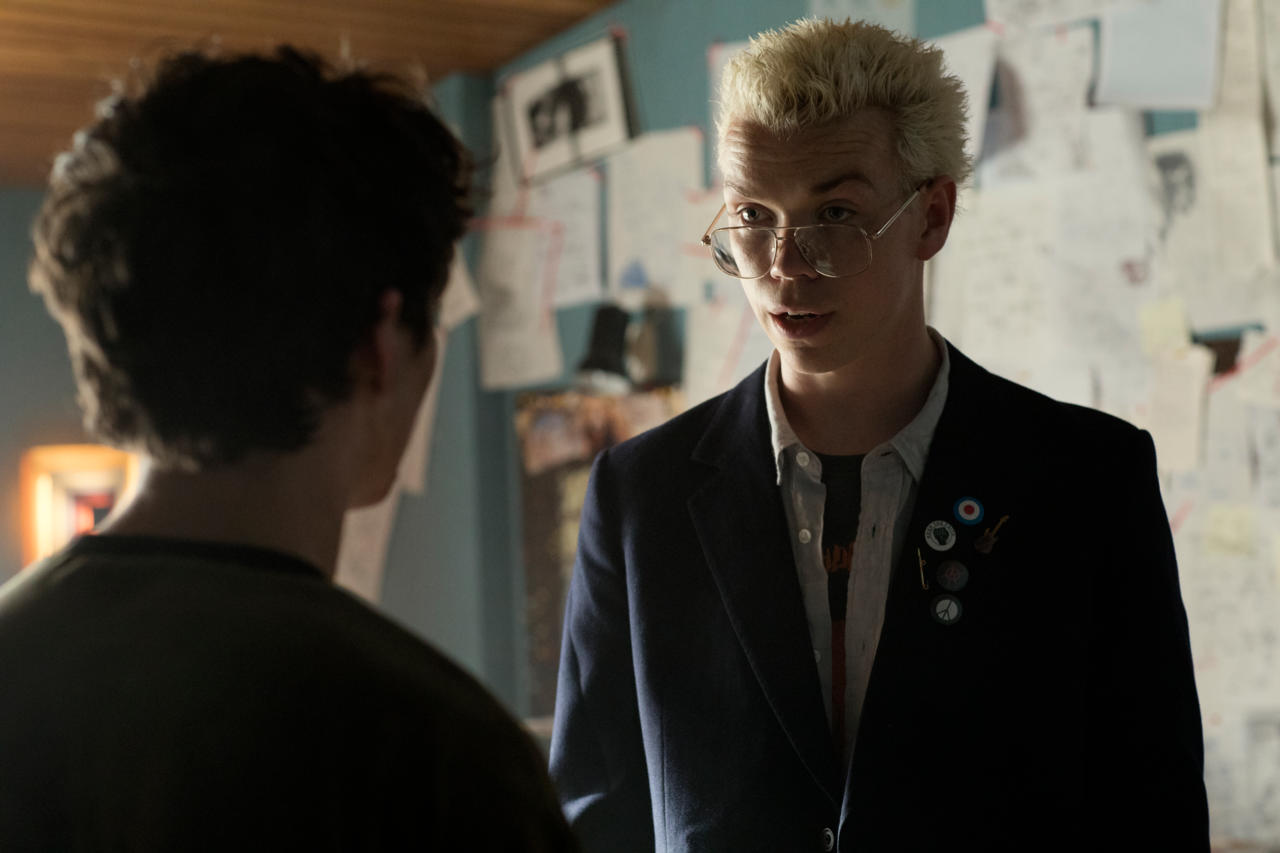Note: This post contains tons of spoilers for Black Mirror: Bandersnatch, so if you haven't watched it, read on at your own risk.
One of the earliest choices in Bandersnatch is a bit of a trap. The feature-length Black Mirror episode is also a choose-your-own-adventure story, and this early choice works to teach viewers unfamiliar with the concept of branching narratives about how the concept works. It's effectively an immediate game over that results in restarting the story, but the dead-end branch early in Bandersnatch also hints at one of the interactive episode's most interesting underlying ideas.
The choice is only the third that viewers come across, when Stefan (Fionn Whitehead) first arrives at Tuckersoft and is offered a chance to work with the company, and his game developer idol Colin Ritman (Will Poulter). Stefan has been working on an intricate game called Bandersnatch that's all about making choices and following various branching paths. When the Tuckersoft guys offer Stefan the chance to work with them, viewers can either choose for Stefan to throw in with the company or continue working on the game alone.
It seems likely that most people would choose to join the company, which is, seemingly, Stefan's dream and an ideal outcome. The trouble is, choosing to work in the Tuckersoft offices puts Stefan at the whim of Mohan Thacker (Asim Chaudhry), whose biggest concerns are getting the game out on time and on budget. Stefan finishes the game but it's compromised, thin, and far from his original vision.

It's by far the least painful of the endings for Stefan, which get much more tragic from here, but a useful teacher for viewers--as Stefan watches a TV show that reviews video games and hears about all the weaknesses of his game, he tells his dad (Craig Parkinson) that he's going to "try again." Stefan storms out of the room, and a second later, reawakens in his bed at the start of the film, preparing again for his initial visit to Tuckersoft.
What's interesting about Bandersnatch is the way the film builds its interactivity into the narrative. It's not just that you go back to key moments in the narrative and pick different choices to see how things will play out differently; there's something deeper at work in the story, and some of the characters become aware that they've been forced down multiple different paths. As that first dead-end path suggests, Stefan is aware of his ability to go back in his story and attempt a different outcome--essentially, to time travel. What he knows and when he knows it is hard to track, though.
A later conversation between Stefan and Colin lays out some version of what's underlying Bandersnatch: multiple, parallel realities. Colin basically likens the world to Stefan's game, where all choices are available, and in other timelines, Stefan can try those choices and bring them to their conclusions. What's important isn't the individual timelines, according to Colin, but how they influence each other, and over the course of Bandersnatch we see Stefan seemingly being influenced more and more by those failed timelines and our choices in creating them.
How Stefan accesses these alternate universes is never really clear, but they do give him some limited ability to time travel, and seemingly to take at least some knowledge and familiarity with those other timelines with him. Whenever Stefan fails to achieve his optimal path, he finds himself resetting to that first day when he heads to Tuckersoft. Again, it's not clear how much Stefan knows or remembers--but since we the viewers are making his key decisions and we can remember what happened, we're able to help him navigate toward better outcomes.

Like a lot of time travel stories, though, for Stefan, time travel almost always makes things worse. Every time he hits a story dead end and restarts, the changes tend to escalate the horribleness of his life as he tries to complete Bandersnatch. One path results in him killing his father; another choice after that finds Colin arriving at Stefan's home as he's trying to hide the body, which can lead Stefan to kill Colin. In fact, there are a lot of endings that result in Stefan engaging in some kind of carnage.
And for all the timelines Stefan accesses, there's one powerful regret he can never take back. That's the death of his mother, who was killed in a train derailment after she was delayed by a five-year-old Stefan looking for a toy his father had hidden from him. Stefan blames his dad for his mom's death, as well as himself, and that event informs just about everything about him throughout the story. Tellingly, a flashback lets the viewer visit the moments before Stefan's mother's death, where we're prompted to stop looking for the toy and go with her, or stay and search for it. It's the only choice in Bandersnatch with only one option, because no matter how much Stefan wants to change it, he can't.
Looked at as a whole, it can be kind of tough to track the throughline of what Bandersnatch is getting at. There's a whole divergent storyline in which Stefan comes to believe he's being monitored and controlled by a government conspiracy; another has him plagued by the supernatural demon from Bandersnatch. Still another reveals to him that he's actually controlled by Netflix viewers, which takes him to a couple of weird moments in which he has an action movie fist fight with his therapist and dad, or a fourth wall-breaking interaction with the Bandersnatch film crew.
Looked at as a time travel story, though, things become a little clearer. Though the story plays with ideas of choice, ceding free will to technology, and searching for escapism in digital media, as a time travel story, its primary focus is on obsessing over past mistakes that can't be changed. Stefan is unable to get over his mother's death or to stop blaming his father and himself for what happened, and that inability is ruining his life. His obsession with trying to change that event only makes things worse.

There are plenty of time travel stories that deal with those same ideas, often ending on the tragic note of the main character finally succumbing to their obsession. In Bandersnatch, the ultimate conclusion doesn't come from Stefan fixing the past--it comes from him tragically accepting that he never will. What feels like the ultimate conclusion of the story is when, after listening to Colin, Stefan discovers that he can use a mirror to travel back to the death of his mother.
With the right choices, Stefan can travel back in time, locate the toy, and place it where he lost it, which allows five-year-old Stefan to find it and change the past. But that doesn't mean Stefan saves his mom and fixes his life, as one might expect in a more traditional time travel story. Finding the toy doesn't allow Stefan's mother to leave earlier and avoid the train derailment. But replaying the moment gives the viewer a new choice: to let Stefan go with her. He spends his final moments with his mother on the doomed train, dying with her instead of lose her.
After all those resets, different paths, and alternate choices, what seems like the culmination of Bandersnatch--which is itself a bit speculative since the story can be replayed over and over--is Stefan coming to terms with his trauma over his mother's death. Stefan might be able to try different choices, but he can't fix anything through time travel and venturing through different realities. The only thing he can ultimately change is himself. Or rather, Stefan realizes that he never will.
The attraction of the idea of time travel is in how we might alter our own lives with the benefit of hindsight, but like most of its sci-fi concepts, Black Mirror uses it for a downbeat look at the ways we try to escape the things that harm us. Bandersnatch's point is that the benefit of escapism, whether it's obsessing about how to fix our mistakes or getting lost in alternate worlds, isn't in the escape from reality, but what we learn about ourselves before returning to it.
